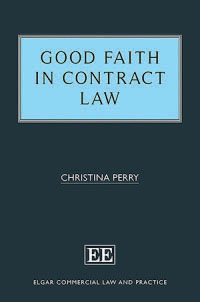
- Author: Christina Perry
- Publisher: Edward Elgar Publishing
- ISBN: 978-1-80392-965-1
- RRP: £155
In contrast to various other legal systems, the contract law of England and Wales has traditionally rejected the imposition on contractual parties of a general duty of good faith, and has addressed potentially problematic conduct by the contractual parties by way of specific legal techniques such as misrepresentation, duress, and the implication of terms (whether in law or in fact). As Lord Justice Bingham put it in Interfoto Picture Library Ltd v Stiletto Visual Programmes Ltd [1987] EWCA Civ 6, the approach of English law has been to develop ‘piecemeal solutions in response to demonstrated problems of unfairness’.
The approach adopted in domestic contract law has, however, changed significantly over the past few years following the decision in Yam Seng Pte Ltd v International Trade Corporation Ltd [2013] EWHC 111 (QB), in which









